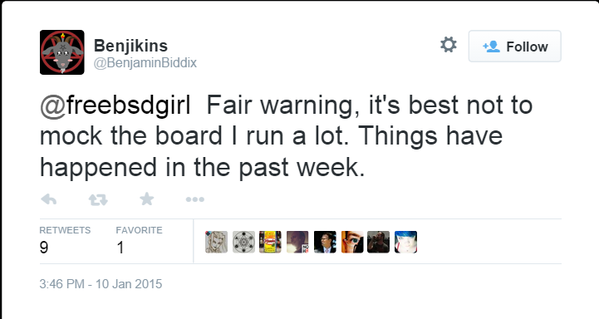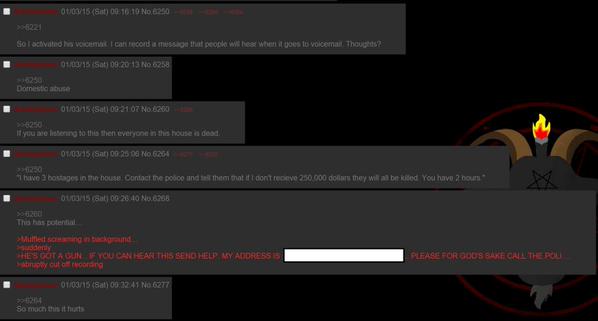The breathless excitement with which we’ve so often been told “the internet changes everything!” has rather dulled us to truly appreciating the ways in which it actually has.
Take the concept of “doxing,” the malicious public release of private information on the internet, which is now in the headlines again after the GamerGate movement (yes, it’s still around) unleashed a torrent of “dox drops” against its critics. On 8chan, a message board that has long been one of the homes of GamerGate, a new subforum called /baphomet/ has become an crossroads between old-guard 4channers, who were not part of GamerGate but shared the movement’s ideology and loathing of its targets, and the most extreme of GamerGaters willing to do anything to punish those it perceives to be corrupt “social justice warriors.” In practice, this has meant doxing any and all critics of the movement, however minor, with an inquisitorial zeal unbounded by any sense of ethics or proportion.
Before we get into the particulars of these recent cases and their consequences, however, it’s worth exploring the dangers of doxing in general.
The Force Multiplier
For most people doxing is seen as relatively unserious, not terribly different from one’s address and phone number being available in a public phone directory. But, as is so often the case, the unique force-multiplying effects of the Internet are underestimated. There’s a difference between info buried in small font in a dense book of which only a few thousand copies exist in a relatively small geographic location versus blasting this data out online where anyone with a net connection anywhere in the world can access it. Further, the initial point of release is almost always before a pre-existing hostile audience—those most likely to see the dox first (like, say, 8chan or 4chan’s /b/ board) are those most likely to act on it maliciously, in other words.
In addition, a dox release is a form of targeting. Even if some of the data was publicly available, it was often buried amidst the screaming noise of literally millions of other data points. To dox is to elevate certain data above others, highlighting it and thus painting a target on someone’s back by making personal information– home and workplace addresses, phone numbers– easier to see. It feeds impulsiveness by removing most of the steps required to dig up existing public info, to say nothing of the effort required to find private information (like social security/insurance numbers, et cetera), putting info in the hands of those who would otherwise be too lazy to find it themselves.
To dox someone, then, is to make it easy for anyone in the world to use your private information maliciously and aggressively, and to target them by elevating this individual above the rest of a mass of internet users.
This has an additional effect: crowdsourcing harassment. A dox drop is like releasing a contagion into the air. From the moment one hits “send” or “post,” they have officially (and sometimes deliberately) lost all control over what that data will be used for. If anyone is able to see and access that data, then it can be used by anyone for any reason, irrespective of the intentions of the dox dropper. This in particular — the impossibility of controlling the impact of your dox drop — is what makes doxing so incredibly dangerous. You never know who might be watching or to what end. The most malignant of doxers actually rely on this dimension of signal boosting, putting them at a remove from any harm that may be caused by their dox drop; should someone get hurt, it’s unlikely the original dropper is directly responsible, after all.

A twitter message by Benjamin Biddix, the administrator of 8chan’s /baphomet/ board making an almost hilariously mafia-style threat to developer Randi Harper.
Special Weapons and Tactics in the Digital Age
This brings us to one of the more common perils of doxing: swatting. In extreme cases, a person’s name and home address will be used to phone in a false emergency call meant to impel the police to violently raid the target’s home. They may accuse the dox victim of building a bomb, holding hostages, hosting a drug lab, or any number of other things likely to prompt a SWAT raid on the target’s home. This has been a popular use of dox in the gaming community in particular, and has returned to the national spotlight as GamerGate’s most extreme wing fights for relevance in the new year, swatting three people since January 1.
In Portland, Oregon the former home of GamerGate critic and game developer Grace Lynn was swatted on January 3rd, terrorizing its current resident with the sudden onslaught of dozens of police officers. She was one of /baphomet/’s first targets.
In Washington State, on January 9th, Israel Galvez, a longstanding critic of GamerGate who catalogues the movement’s excesses on Twitter, received a night time visit from five police officers. The lack of a more aggressive response was due to Galvez having warned his local police department that /baphomet/ had doxed him and his family.
In British Columbia, on January 11, Ashley Lynch, owner of a TV post-production studio, was swatted courtesy of /baphomet/. She received a late night visit from the Royal Canadian Mounted Police. Her crime, according to /baphomet/? Following a GamerGate critic on Twitter.
These are but the most prominent cases. The list goes on; critic after critic has been doxed by /baphomet/, all of them linked solely by having publicly criticised GamerGate in some fashion. The Ars Technica reporter who penned this story about Grace Lynn’s swatting was summarily doxed by /baphomet/, as was Caitlin Dewey who wrote this Washington Post editorial about 8chan and /baphomet/. One supposes that “ethics in gaming journalism” requires violently punishing journalists who say things you don’t like.
In this late phase of GamerGate’s existence, where the bulk of the movement’s fire seems to come from cesspits like 8chan which harbour and encourage the worst impulses of an already angry mob, it has now become a daily ritual for some of us to monitor feeds and websites to ensure we were not targeted, especially if we are feminist or perceived to be.
The attacks have, after all, been legion. Media critic Dan Olson published a courageous piece exposing the rank child pornography that 8chan has long played host to (one of the things that festers beneath 8chan’s lofty “free speech” banner). For his trouble, both 8chan and GamerGate more widely, tried to paint him as a pedophile, along with Twitter user srhbutts, a trans woman who has also extensively catalogued the movement’s many extreme moments through Twitter. Some on 8chan have talked about emailing letters to the neighbors of both critics “informing” them that they are “child molesters.” Still others muse about sending smokebombs, flooding the target with empty USPS boxes, or sending them sex toys. Creative uses for dox abound.

A threatening email sent to Israel Galvez. He is cisgender, for the record, but GamerGate has a special loathing for trans people.
I am at pains to remind the reader that all of this traces back to opinions about videogames, a seething hatred of feminists who play and write about them, and a harassment campaign that began as an extended act of domestic violence against developer Zoe Quinn by a vengefully abusive ex-boyfriend. In the name of this, an extremist minority of gamers have dedicated themselves to ruining the lives of anyone who dares cross them. /baphomet/ is, in many ways, about GamerGate returning to its roots in 4chan-style image board culture, which was responsible for the initial wave of organisation in the movement last August, initially devoted solely to Zoe Quinn but spreading to become a mass, chan-style harrowing of any woman in gaming who expressed a feminist opinion, or any man who appeared to support them. /baphomet/ and 8chan more widely merely represent the unpretentious reality of GamerGate, and remind us these forces will be with us long after this movement is finally gone.
This nadir of GamerGate’s long, slow death spiral is a reminder of what the internet can facilitate; it rightly makes a mockery of the idea that the internet is less real, is “just” or “merely” virtual. It is real, as a certain cadre of angry young men are eager to impress upon you through the callow manipulation of militarised police.
The longer we indulge in this tragic fantasy of the internet’s unreality, the longer such extremists can play us for fools.




Join the Conversation